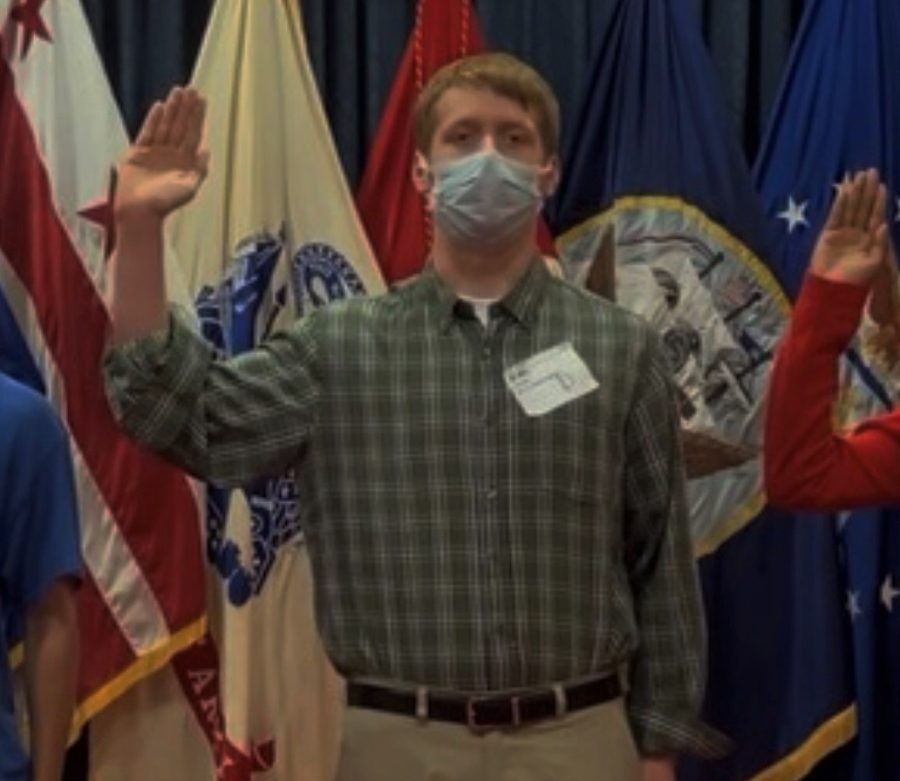Q&A with Kevin Cropp, U.S. Army enlistee
Kevin Cropp is a senior at Stafford High School. Cropp chose to enlist with the U.S. Army in August 2022 after being scouted by a recruiter. Since being officially sworn in, he has been preparing for his ‘ship out’ date on June 20, 2023. The following is a Q&A with Cropp about his experience of becoming a member of the U.S. Military.
Editor’s note: This interview has been edited for clarity.
Q: When did you realize you wanted to join the army?
Kevin Cropp: Well, the opportunity opened up when I lost, like, a bunch of weight. So, originally, I was definitely going to go into software engineering. I was padding my GPA so I could get accepted jnto Norfolk or some of the local colleges but then I lost all this weight and it was like “Holy moly, I can do this now if I wanted to.” I was really thinking I wanted to do it. I was working over the summer and an army recruiter literally tapped me on the shoulder like, “Would you be interested in being a U.S. Army soldier?” and I was like, “Yeah, alright.”
Q: What was the process for enlisting?
KC: Well, first you gotta take this thing called the PCAT – everyone takes it – doesn’t matter what branch you’re going into. It’s like a dumbed down version of the ASVAB. It’s only four components; two math and two English, and if you score high enough every branch will want you. It’s really to see if you’re dumb.
Q: When and where will you be deployed?
KC: I’m going to Fort Carson, Colorado. It’s like 20 minutes away from Colorado Springs where the Air Force academy is. It’s also where the 4th Infantry Divison and the Special Forces are. Right now, I have a possible rotation to Europe because they have a sustained amount of soldiers in Europe because of the Russian agression – this is from before the war escalated. My unit, the 4th Infantry Unit, they have a brigade there rotating ever so often, so there’s like a one-in-four chance that I’ll be in Europe before I go to Carson.
Q: What is your specialty in the army?
KC: I chose 11X-Ray, which is infantry. This is what they call ‘Combat Arms MOS,’ or a combat job. They call it a ‘grunt job,’ essentially. The goal of the infantry is that you’re going to learn how to destroy the enemy in the most violent and accurate way possible. It’s a serious job – of course I’m speaking from outside the shell – but the goal is that, when we go to war, we’re gonna have to kill someone.
Q: What’s been your biggest challenge?
KC: The biggest challenge right now is getting physically and mentally prepared to go. The biggest issue in the military is mental health. So many suicides a year in all the branches. They prepare physically, but most people drop out physically. I’ve heard horror stories about how people drop out in basic [training] and their company does something and then two people try to commit suicide. I’m trying to mentally prepare; get all my fares in order. I’m gonna be gone for six months compared to some people who are gone for four or five.
Q: What are you looking forward to most?
KC: I wanna prove myself; get some confidence; say I did something that most people wouldn’t. Kind of a redemption for me not going and getting my ‘Eagle Scout’ rank in Boy Scouts. Aside from that, I wanna prove that I’ve done something that most people could never do. It’s a kind of credibility or authority. If I decide to go in, I’m gonna definitely gonna try to get in special forces. If I’m gonna do combat arms, I might as well go for SF.
Q: How do you see yourself in 10 years?
KC: In ten years? 50% chance I’ll be out of the military, another 50% chance I’ll be in the military but on a reduced role, and another chance that I’m already out and I’m just assigned to go civilian; probably finishing my degree because I planned on – after any of these – getting my associates degree.
Q: How will your time in the military affect you in the long term?
KC: Financially? Horribly. Retirement is 20 years for all the branches, actually. I’m not gonna have a lot of money. I’m planning on saving most of the money I earn. They have the TSP Fund that the Army has; I’m gonna put a good chunk of my money into that. Physically, it’s not gonna benefit me. Thing with combat arms dudes is – even just people in the military in general – they typically have bad knees and a sore back all the time.
Q: What advice would you give to someone else who wants to join the army?
KC: If you’re gonna do something dangerous, make sure you evaluate the next step; have plans beforehand. Because, originally, if I wasn’t gonna pass the PCAT, I was gonna go into civil service and go into the EMTs. Plan ahead because you don’t know if you’re gonna make it through your whole contract. People break their legs all the time; people get hurt in accidents all the time. So, just think of what you have right now. Create an ‘If all else fails’ condition’ because if you break your leg, what’re you gonna do after? Your leg is broken and now you have to go to the VA [Veteran Affairs], and that’s gonna be a b*tch, but what are you gonna do for employment?
Your contribution will allow us to purchase equipment, attend education conferences, and cover our annual website hosting costs.











